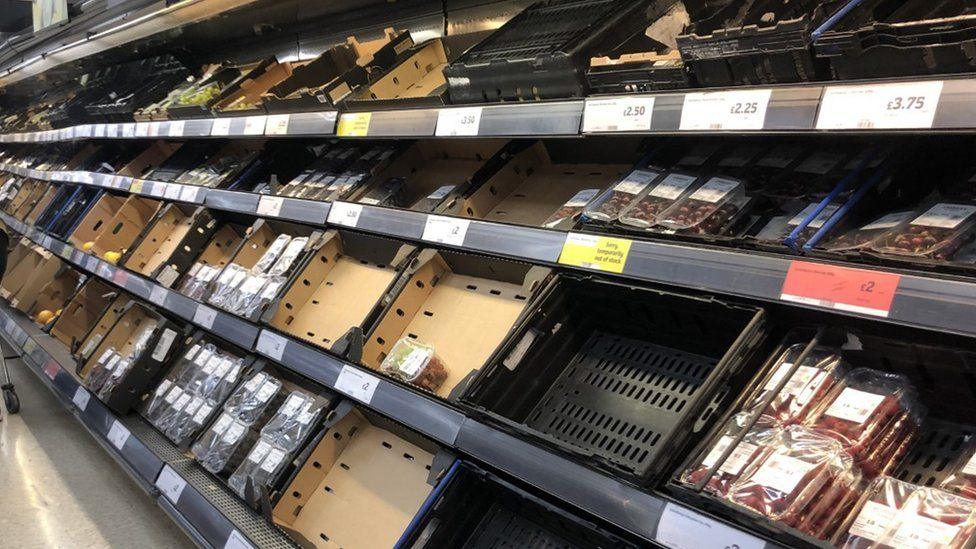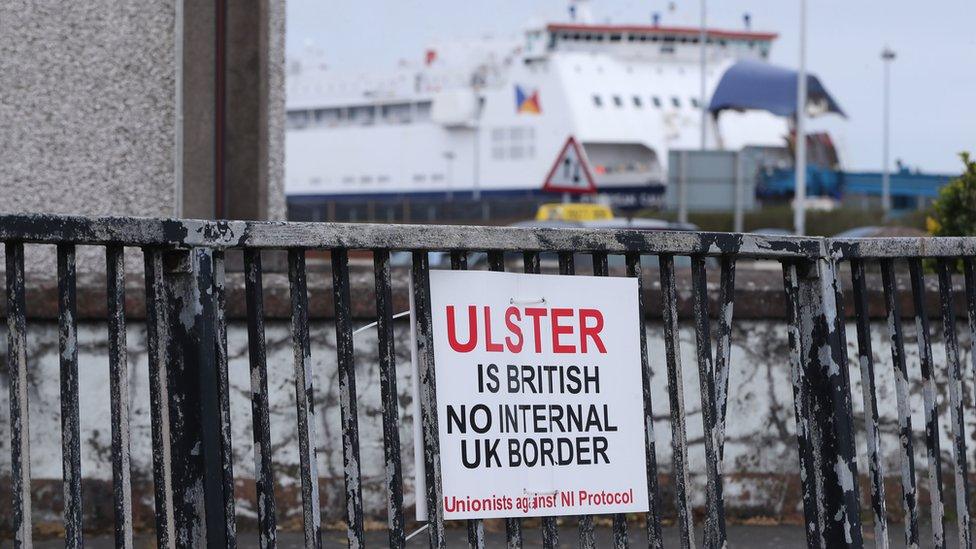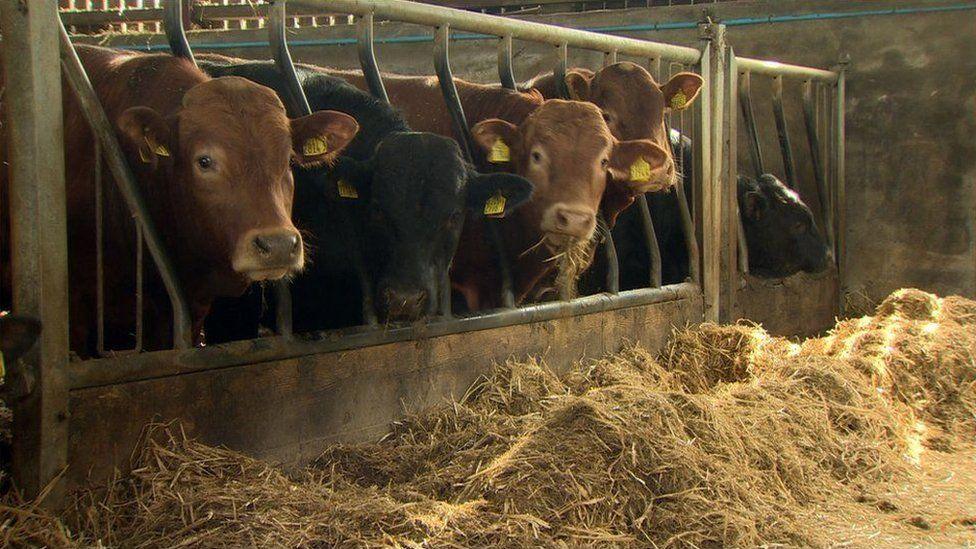Brexit: UK proposes new Irish Sea food checks from October
- Published
- comments

Supermarkets in NI struggled for some food stocks when the protocol was implemented in January
The UK is proposing to phase in new Irish Sea border checks on food products in four stages from October.
The details are contained in a Northern Ireland Protocol roadmap shared with the EU, which has been seen by the BBC.
The protocol is the part of the Brexit deal which creates a trade border between Great Britain and Northern Ireland.
In March, the UK delayed introducing some new border processes without EU agreement.
That led to the EU starting legal proceedings against the UK.
At the end of March, the UK sent the roadmap to the EU, which sets out how the two sides should work together to implement the protocol.
It has formed a starting point for ongoing technical talks between officials.
On Sunday, the UK's chief negotiator, Lord Frost, urged the EU to rapidly "find a new approach and new solutions"., external
The UK roadmap document covers more than 20 separate issues including medicines, access to databases, pet travel and the VAT treatment of second-hand cars.


At last.
Now we can see in black and white the problems with the protocol that have been identified by both sides, rather than relying on leaks and second-hand accounts. That's useful.
And there are a lot of issues to be resolved, reminding us that agreeing a deal is one thing and implementing it in the real world is another.
This roadmap also shows the potential trouble ahead.
If the UK's scheme for sending supermarket goods from Great Britain to Northern Ireland is going to be phased in during 2021 and 2022 (and 2023?) then the UK will probably have to ask the EU for another extension to the grace period before European laws will be fully respected, which won't go down well in Brussels.
Then the EU also needs to agree that British-regulated medicines can be sold in Northern Ireland.
And when exactly will the Northern Ireland Executive start building the bricks and mortar customs facilities that the UK has promised the EU but which are so offensive to the DUP's newly-elected leader? The dates are still a secret.
And a moment of truth seems to be brewing, with the Brexit Minister Lord Frost suggesting that in June or July the UK will decide whether the protocol can be made to work in the long term.

The movement of food products from Great Britain to Northern Ireland has been the biggest practical challenge of the sea border.
Northern Ireland has remained a part of the EU's single market for goods while the rest of the UK has left.
That means food products entering Northern Ireland from Great Britain need to be professionally certified and are subject to new checks and controls at ports.

Unionist parties have said they oppose the protocol for placing a trade border in the Irish Sea
The two sides agreed an initial three-month grace period which meant supermarkets did not need to comply with all the EU's usual certification requirements.
The UK unilaterally extended that grace period until October; the roadmap suggests what should happen next.
Four phases
The document states: "The UK will roll out official certification in four phases."
It suggested that phase one in October will cover fresh meat products and phase two at the end of January 2022 will cover dairy products, plants and wine.
Phases three and four would cover fruit and vegetable marketing standards, pet food, organics and composite products.
No dates are given for phases three and four with the document saying a full timeline "requires additional clarity on infrastructure and staffing" as well progress on integrating the UK and EU certification systems.
It is not yet clear if the EU would consider these timelines to be reasonable.

Meat and dairy products will be among the issues tackled by phases one and two of the proposal
Some details are included on the UK's Digital Assistance Scheme (DAS) which is intended to digitise the agri-food certification and verification process.
It said first users should be registered next month with final testing in August, roll out in October and integration with the EU system in January.
Some parts of the roadmap are vague.
For example, no target dates are suggested for the construction of permanent border control posts at Northern Ireland's ports despite these facilities having planning permission and funding.
However, the document added the government will set out "a detailed delivery plan" for permanent facilities.
In other areas, there is a greater commitment to giving dates.
The UK, for instance, said it proposes to issue guidance by the end of this month on the long-term arrangements for business-to-consumer parcel deliveries from Great Britain to Northern Ireland.
On Monday, outgoing Northern Ireland First Minister Arlene Foster said we needed to see action in relation to the Northern Ireland Protocol from the UK government.
Mrs Foster told MLAs that Lord Frost recognised that there were no unionists in favour of the current arrangements.
"Instead of listening to words we actually [need to] see action in relation to the protocol," Mrs Foster said.
'Not an identity issue'
Speaking from Dublin on Monday, Taoiseach (Irish Prime Minister) Micheál Martin said the Northern Ireland Protocol was the best outcome for dealing with the damage caused by Brexit.
During an online meeting with the Institute of International and European Affairs, Mr Martin said people needed to focus on the full implementation of what had been agreed.
The taoiseach said Brexit had caused damage which could not be undone but added that the authorities must now do what they could to limit its damage.
Mr Martin said there was a process to resolve difficulties, and said Ireland and the EU were in solution mode.
He also said he was concerned about the mood in unionism in relation to the Northern Ireland Protocol.
But he argued the Northern Ireland Protocol did not interfere with the principle of consent and was not an issue of identity or sovereignty.
He suggested the arrangement could be very advantageous to sectors in Northern Ireland, including foreign direct investment.
The taoiseach also told the audience he had been reading about how the protocol was helping Northern Ireland farmers to sell milk south of the Irish border.
He said he had a sense many more moderate people were happy with the protocol but were keeping their heads down.
Mr Martin added his government would not "stop being an open door" to unionists.
Related topics
- Published2 February 2024

- Published7 May 2021
